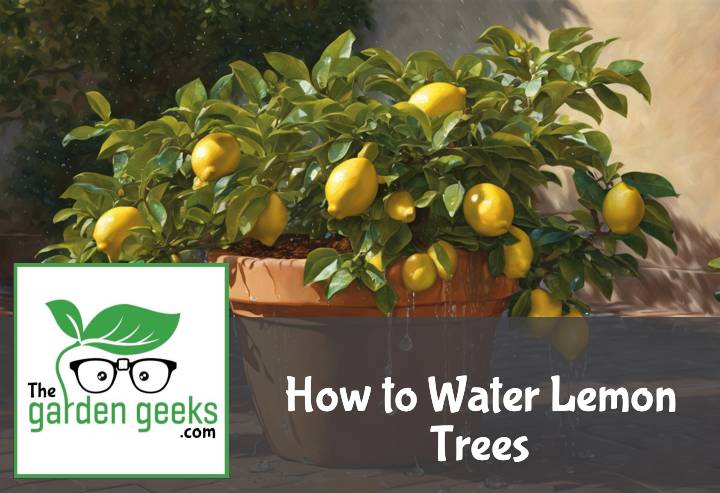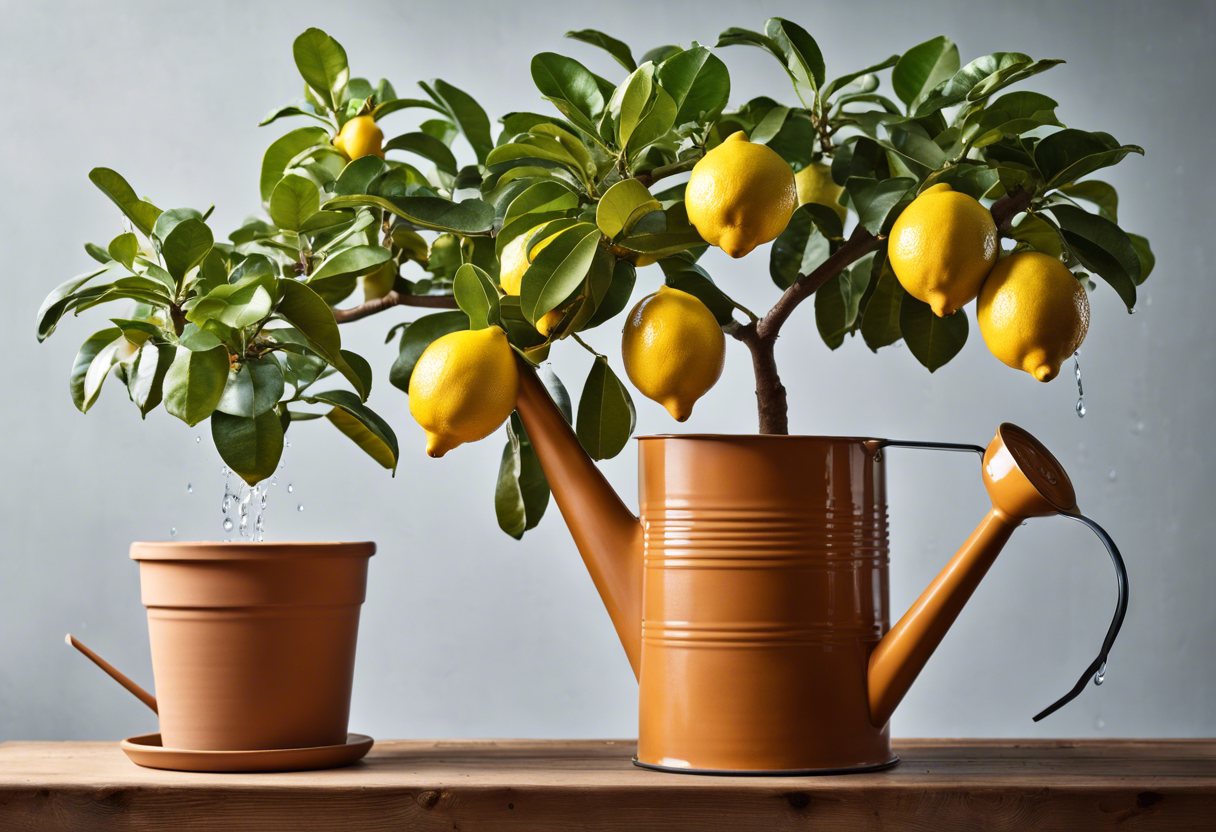Ever found yourself standing in the backyard, hose in hand, staring at your lemon tree and wondering just how much H2O it really needs? Trust me, you’re not alone. We’ve all been there, scratching our heads over How to Water Lemon Trees.
But don’t fret! You’re about to embark on a citrusy journey that will quench your thirst for knowledge (and your tree’s thirst for water). So buckle up and get ready to dive into the world of proper lemon tree hydration. Keep reading about How to Water Lemon Trees.
Key Takeaways
- Water lemon trees deeply once a week, or when the top 2 inches of soil are dry.
- Avoid overwatering as it can lead to root rot.
- Use a soaker hose or drip irrigation system for efficient watering.
- In hot weather, increase watering frequency.
- Mulch around the tree to retain moisture and control temperature.
- Adjust watering based on season, climate, and tree age. Young trees need more frequent watering.
Why is Proper Watering Important for Lemon Trees?
Well, folks, proper hydration for citrus plants isn’t just about quenching their thirst. It’s a matter of life and zest! You see, the importance of watering lemon trees goes beyond just keeping them alive. It’s crucial for maintaining that vibrant health we all love in our lemon trees.
The Role of Water in Lemon Tree Health
Water plays a starring role in the overall health and growth of your lemon tree. Think of it as the lifeblood of your plant. It’s not just about hydration for lemon trees, but also about nutrient transportation.
You see, water helps transport essential nutrients from the soil to different parts of the tree. Without enough water, your tree might struggle to absorb these nutrients, leading to a less-than-healthy look.
But wait, there’s more! Water also plays a key role in photosynthesis – you know, that process where plants convert sunlight into food? Yup, without enough water, this process can be hindered too. So remember folks – water and nutrient absorption, along with photosynthesis are vital for maintaining healthy lemon trees.
Consequences of Overwatering and Underwatering
Now let’s talk about what happens when you give your lemon tree too much love…or not enough. Overwatering or underwatering can have some serious consequences on your citrus buddy.
Overwatering is like forcing your tree to live in a swamp. Not cool! This can lead to root rot and other diseases – yuck! Look out for yellow leaves or a droopy appearance as signs of too much water.
On the flip side, underwatered citrus plants start looking sad real quick. They might drop leaves or show signs of wilting – basically crying out for help! These are symptoms of dehydration in plants.
So remember folks: balancing water levels for healthy trees is key. It’s all about finding that sweet spot between too much and too little when learning how to water lemon trees.
How Often Should You Water Lemon Trees?
When it comes to lemon tree care, knowing how often to water is crucial. The watering citrus trees frequency can make or break your lemon tree’s health. But, don’t worry! We’re here to help you figure out the perfect lemon tree watering schedule for maintaining your lemon trees.
Factors Influencing Watering Frequency
First off, let’s talk about the elephant in the room – climate. Yes, folks, climate impact on watering is real and it’s significant. If you’re living in a hot and dry area, your lemon tree might need more frequent watering than those in cooler regions.
Next up is soil type. Believe it or not, the type of soil can greatly affect your tree’s hydration needs. Some soils retain water longer than others, so keep an eye on that when planning your watering schedule.
Lastly, let’s not forget about our tree’s age. Just like humans, as a lemon tree age, its water needs change too. Younger trees generally require more frequent watering compared to mature ones.
Signs Your Lemon Tree Needs Water
Now onto recognizing when your citrus buddy is thirsty. One of the most common lemon tree dehydration symptoms is changes in leaf appearance. If you notice leaves turning yellow or curling at the edges, it might be time to grab that hose!
Another sign could be fruit drop before they’re fully ripe – a clear cry for help from under-watered citrus trees. So if you see premature fruit falling from your tree, don’t just stand there! It’s high time for some serious citrus hydration action!
Remember folks; knowing how to water lemon trees isn’t just about pouring H2O onto them now and then. It’s about understanding their needs and responding accordingly!
What is the Best Time to Water Lemon Trees?
When it comes to how to water lemon trees, timing can be a game-changer. The best time to water lemon trees is when they can soak up the moisture without getting scorched by the sun. This usually means early morning or late evening, depending on your local climate and sunlight exposure.
Morning vs. Evening: Pros and Cons
Morning watering has its perks. It allows the tree to absorb water before the heat of the day kicks in. Plus, any excess moisture on leaves will evaporate, reducing chances of fungal diseases. But here’s the twist – if you’re an early bird who misses the worm, you might leave your tree thirsty during peak sunlight hours.
On the flip side, evening irrigation seems like a chill option. Your tree gets enough time to drink up without any rush. But beware! If temperatures drop significantly at night, your tree might catch a cold (read: root rot) from sitting in wet soil.
So what’s best? Well, it depends on your local weather and how much you love waking up early!
Seasonal Adjustments in Watering Schedule
Now let’s talk seasons because they play a big role in lemon tree care too! As seasons change, so do your lemon tree’s watering needs.
In summer, when it’s hotter than a jalapeno pepper out there, your lemon tree will need more frequent watering. You don’t want it drying out like a raisin under that scorching sun!
Winter is another story though. When temperatures drop and days get shorter (and gloomier), your citrus buddy won’t need as much hydration. So ease off on those watering sessions.
Remember folks – observing and adjusting according to your tree’s needs is key! After all, no one likes being force-fed or starved!
How Much Water Does a Lemon Tree Need?
When it comes to lemon tree watering needs, there’s no one-size-fits-all answer. It depends on factors like climate, soil type, and the tree’s size and age. In general, citrus trees love a good soak, but they’re not fans of waterlogged roots. So, finding that sweet spot is key in watering lemon trees properly.
Determining the Right Amount of Water
Now you might be wondering how to figure out this magical amount of water your lemon tree needs. Well, it’s all about observation and adjustment. If your tree’s leaves start to yellow or drop off, you might be overdoing it with the H2O. These are classic signs of overwatering in citrus trees.
On the flip side, if your lemon tree looks a bit sad and droopy, it could be crying out for more water. This is what we call underwatering in lemon trees. The goal here is to maintain consistent moisture without making your tree feel like it’s taking a permanent bath.
Adjustments Based on Tree Size and Age
As your lemon tree grows from a cute little sapling into a mature citrus-producing machine, its water requirements will change too. Younger trees need more frequent watering as they establish their root systems – think of them as thirsty toddlers! This is what we mean by watering young lemon trees.
But as they grow older and more independent (just like teenagers), they can handle longer periods between watering sessions. That’s when you’ll want to adjust your watering schedule accordingly for these hydrating mature citrus plants.
Remember folks; every lemon tree is unique! So keep an eye on yours and adjust as needed because that’s how you master the art of how to water lemon trees!
Techniques for Watering Lemon Trees
When it comes to lemon tree care, getting the watering right is crucial. You might be wondering how to water lemon trees effectively, right? Well, there are two main methods that work wonders: surface irrigation and drip irrigation. These techniques are the backbone of watering citrus trees and maintaining their health.
Surface Irrigation Method
First up, let’s chat about surface irrigation. This method involves watering the soil directly around your lemon tree. It’s like giving your tree a refreshing drink! The benefits of surface irrigation are pretty cool too.
For starters, it helps distribute water evenly across the root zone. That’s exactly what our citrus friends need for optimal growth! Plus, this technique is super simple and doesn’t require any fancy equipment. Just you, your watering can or hose, and your beloved lemon tree.
Remember folks, when it comes to lemon tree surface irrigation, consistency is key! So keep that water flowing and watch your citrus buddy thrive!
Drip Irrigation Method
Now onto the second method – drip irrigation. This one’s a bit more high-tech but trust me, it’s worth it! A drip system for citrus trees delivers water directly to the roots through a network of tubes.
The advantages? Well, it reduces water waste (great for Mother Earth!) and prevents overwatering – a common mistake in lemon tree care. Plus, with this method you can set up an automatic timer so your tree gets its H2O fix even when you’re away.
So there you have it folks – two fantastic methods on how to water lemon trees! Whether you choose surface or drip irrigation remember – happy watering equals happy lemon trees!
Tips to Improve Water Absorption in Lemon Trees
When it comes to how to water lemon trees, there’s more than just turning on the hose. You gotta think about the soil, drainage, and mulch too. These factors can make a big difference in improving water absorption and overall lemon tree care.
Importance of Soil Type and Drainage
Let’s start with the dirt. The soil type for lemons is crucial, folks! Citrus trees love well-draining soil. It helps them soak up water at just the right pace. Too slow or too fast, and your tree might struggle.
Now, onto drainage. A good citrus tree drainage system is like a great pair of shoes for your tree—it keeps it comfortable and healthy. Proper drainage ensures that water doesn’t pool around the roots, which could lead to root rot or other diseases.
Remember this: The importance of good drainage cannot be overstated when considering the water absorption rate. And don’t forget that the optimal soil for citrus is one that drains well but still retains enough moisture for the tree’s needs.
Mulching to Retain Moisture
Next up: mulch! Mulching is like giving your lemon tree a cozy blanket—it helps retain moisture and improve water absorption.
The benefits of mulching are many: it reduces evaporation from the soil surface, regulates soil temperature, and even adds nutrients back into the ground as it decomposes.
Using a good quality organic mulch can work wonders for your citrus trees’ health. So remember folks, if you want to improve how you water your lemon trees, don’t forget about mulch! It’s not just about keeping things tidy—it’s also about boosting that all-important moisture retention with mulch.
And there you have it—improve water absorption with mulch, and you’ll be well on your way to healthier, happier lemon trees.
To Wrap Up
Just like a toddler needs a balanced diet to grow up strong, your lemon tree craves the right amount of water. We’ve dished out all the juicy details about How to Water Lemon Trees in this post.
So, don’t let your citrus pal go thirsty! Give it a proper drink and watch it flourish. After all, who doesn’t love a good lemonade on a hot day?





